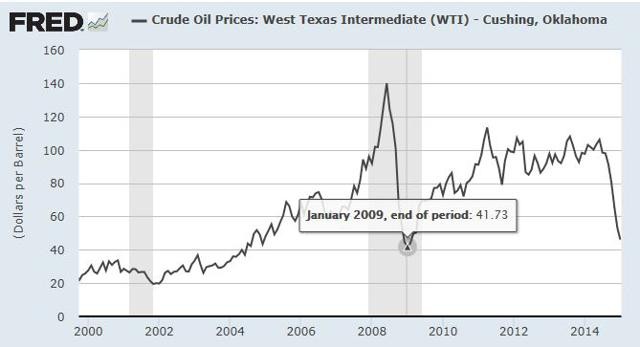Will Oil Uncertainty Present an Investing Opportunity
Post on: 17 Июнь, 2015 No Comment

For there is nothing either good or bad, but thinking makes it so.
— Hamlet, Act 2, Scene 2
In mid-November, I had the pleasure of being in a few of the United Arab Emirates — Abu Dhabi, Dubai, and Sharjah, specifically — for work, along with my colleague Charly Travers. We were at a healthcare conference with executives from a number of the publicly traded hospitals in the region. The climate was beautiful throughout our stay, temperatures coming in at a pretty consistent 80 to 85 degrees Fahrenheit, a light breeze coming off the Persian Gulf while I was in downtown Abu Dhabi, and nary a cloud.
Wait, hold that for a second. Now that I think about it, on our last night, Charly and I noticed, for the first time in our six days there, a couple of clouds. Nothing remotely ominous, but it was enough for Charly to shoot some video and post it on Facebook — subtly taunting those who didn’t have the good fortune to be in 82-degree temperatures at night in mid-November. If you’re the kind who likes to hunt for metaphors in everyday life, you may think we stumbled onto something, because it now looks as if there could be a bit of metaphorical rain falling on the Middle East right now.
During our time in the Emirates, we got to talk with executives in the healthcare, banking, real estate, financial, logistics, oil, and airline industries, and there was a pretty consistent story from all of them. (This was, remember, just over two months ago.) Times were good — the shock that Dubai went through in its own real estate massacre of 2008-2009 was over, jobs were plentiful, and the government had done a good job socking money away during the past five years, as high oil prices — mostly over $100 a barrel — had left the UAE government flush with money. In the opinions of all whom we asked, the UAE was well positioned to continue to thrive under the new market conditions. Perhaps the individual governments of Abu Dhabi and Dubai would have to exercise some mild deficit spending if oil were trading at, oh, $70 a barrel, but even at that level, there were decades of savings in the government coffers that could cover that level of budget shortfall annually. There was, as far as we could tell, no fear whatsoever about the price of oil.
Again, this was just last November.
I’d like to be able to swing back over there now — with Brent crude prices now under $60 — and see whether the tenor has changed at all among the executives we talked to. Certainly it has in the stock market. A recent Reuters article states flatly, Panic returns; UAE minister tries to reassure investors; investors ignore officials’ promises of steady growth. UAE markets hit 1-year lows. I suppose that about sums it up. Even a very healthy government surplus, maintained by a government with a solid track record of staying out of financial trouble (in the case of Abu Dhabi and Dubai, not so much), is no match for the fear that a plunging oil market can create in a part of the world where oil means so, so, so much.
Through mid-spring, the Dubai Financial Market was the best-performing market in the world, because of still-strong oil and the UAE’s announced insertion into the MSCI Emerging Markets Index in the summer. When Charly and I were on the ground, it was still one of the best markets, though it had worked off its summer highs. All those gains and more have been erased in the past few weeks, and it currently stands more than 40% off its May highs.
It’s obvious that investors in the region are gripped at the moment by fear — and not because the country and its economy can’t continue to grow with oil at $60 a barrel. With oil’s relatively low cost of production, Abu Dhabi can still thrive at today’s levels for an intermediate period, and Dubai, while surrounded by oil wealth and a beneficiary of that proximity to wealth, is not itself a significant energy producer. It has a reasonably diversified economy. There should be a bit more confidence in those locales.
Fear rules the day today, however, because oil has managed to fall so far, so quickly — cut nearly in half in just three months — and with no certain floor. There are a million talking heads out there on television opining about where oil is going to settle, and not one of them appears to have more of an edge on the others in terms of getting it right. While there are plenty of paths to a sustainable economy for many of the oil-dependent nations out there, with no meaningful way to project over the short term what the revenues from oil will be, the uncertainty over which of those paths can, should, or will be employed is enough to cripple many investors with fear.
That’s why, in part, we’ve seen the sell-offs in so many global markets. The actual decline in oil prices, of course, leads directly to a lower valuation for oil services and many other energy companies. Banks, too, which are likely to have loans out to oil services companies, are likely to suffer. Also, lower global growth is muting the demand for oil and stands as a reason to value many companies with lower growth inputs over the near term — though this is something that should largely have been incorporated into valuation exercises all along.

On the other hand, lower inputs for companies with significant energy costs improve the margins of many companies, and domestically, lower fuel costs will leave more money in consumers’ wallets, potentially helping many retail operations. So better margins, more consumer discretionary spending, lower growth, riskier lending conditions, some smattering of geopolitical unrest — that’s the most basic of the equations that you might put together as to what to expect. It’s radically oversimplified, yet still too much to process quickly, especially when the underlying price of oil is still moving so dramatically on a day-to-day basis. No wonder investors are solving the complex equation with a sell first, ask questions later response. And not just in the UAE — all around the world.
If investors globally are simply selling stocks because they can’t stand not knowing how everything will shake out, that’s fine for us and any other long-term investors. It’s far too easy, however, to categorize down movements across an asset class globally as simply irrational or unjustified fear. With domestic equities at historically high valuations (at least by some measures), an excuse to take profits might be entirely understandable. Unquestionably, there always are some individual stocks trading above a fair valuation, and some below.
But the current oil price shock delivers the opportunity for solid long-term investments, along with more attractive entry points as investors sell some holdings indiscriminately, fueled by the need to raise cash in a fear-driven climate. Charly and I saw some interesting companies in industries well outside the oil sector, and others on the team have been traveling to other parts of the globe to further research business conditions in other emerging markets. The fear that oil’s weak price today is going to lead to an inevitable decline in some businesses that are in the region but not directly in the oil sector is a fear investors should hope to benefit from in the near future.
But be alert
No matter where or how you invest, it’s always important to control your costs. That’s why my team recently produced a new special report uncovering a number of hidden costs you might not normally consider. It’s absolutely free, and you can access it by following the link here .
Bill Barker is a senior analyst for Motley Fool Funds. Try any of our Foolish newsletter services free for 30 days. We Fools may not all hold the same opinions, but we all believe that considering a diverse range of insights makes us better investors. The Motley Fool has a disclosure policy .














